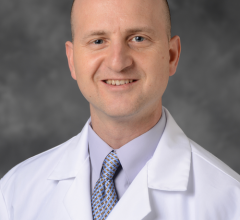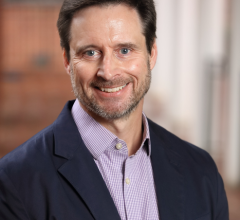October 31, 2014 — The 4th International Symposium on Focused Ultrasound featured clinical and research advances on the use of focused ultrasound technology to treat conditions as diverse as Parkinson's disease and essential tremor, obsessive compulsive disorder, several cancers, hypertension and uterine fibroids. More than 400 clinicians, scientists, government and industry representatives from around the world gathered from Oct. 12-16 to share the latest translational and clinical research in image-guided focused ultrasound.
The symposium, organized by the Focused Ultrasound Foundation, highlighted many promising new applications of this technology. "The preliminary data and newly initiated studies suggest that focused ultrasound is on the precipice, shifting from an innovative early-stage therapy into a tool poised to disrupt the provision of care for some of medicine's most vexing conditions," said Andrew von Eschenbach, M.D., former commissioner of the U.S. Food and Drug Administration, former director of the National Cancer Institute and member of the Focused Ultrasound Foundation board of directors.
The symposium featured a special discussion with former CIA spymaster Tony Mendez, who spoke publicly for the first time about his battle with Parkinson's disease. Tony and his wife Jonna addressed his Parkinson's diagnosis, his recent treatment with deep brain stimulation and their hope that focused ultrasound might soon be a non-invasive treatment alternative.
"We come from a technical background - we were the gadget guys - it was all about clandestine technology and solving problems with new devices. If a device didn't exist, we would invent it and that's where some of our best stuff came from. We've always been interested in new technology and that is why we support the development of new technologies like focused ultrasound so that in the future patients do not have to undergo the trauma of brain surgery," said Mendez.
"We host this symposium to serve as a crucible for fostering collaboration across the field," said Neal Kassell, M.D., founder and chairman of the Focused Ultrasound Foundation. "And having more than 400 experts travel from 24 countries to share their research demonstrates the impressive potential of this non-invasive technology to transform the treatment of many serious medical conditions."
Symposium Highlights
This year's Focused Ultrasound Symposium included 200 scientific presentations that utilized varying mechanisms of the technology for a wide range of diseases and conditions. Highlights include:
Brain Disorders
Several studies assessing the potential of focused ultrasound to non-invasively treat neurological and psychiatric disorders were presented, including:
- W. Jeff Elias, M.D., associate professor of neurological surgery at the University of Virginia, announced that recruitment has been completed for a study of 72 patients using focused ultrasound to treat essential tremor. This pivotal trial, based on a promising pilot study, is being conducted for U.S. regulatory approval and results are expected in about a year.
- Jin Woo Chang, M.D., professor and chairman, Yonsei University College of Medicine, presented results of a feasibility study on the use of focused ultrasound to treat obsessive-compulsive disorder in patients who have failed medical therapy. Four out of nine patients showed improvement six months after the procedure, which is consistent with invasive surgical procedures. The treatment was generally safe, and the results suggest that using focused ultrasound to place a thermal lesion on the brain may lessen the effects of OCD. Based on these results, Chang plans to initiate a study examining the technology's potential to treat depression.
- Javier Fandino, M.D., head of neurosurgery at Kantonsspital Aarau in Switzerland, shared a case report of the world's first non-invasive thermal ablation of a brain tumor with focused ultrasound. As part of a pilot study of feasibility, a portion of a glioblastoma was successfully ablated. Research sites in the United States and Canada are now recruiting patients for other pilot studies of glioblastomas and metastatic brain tumors.
Cancer
Researchers around the globe are studying the use of focused ultrasound to treat many cancers, including breast, prostate, lung, liver, pancreas and soft tissue tumors. In addition to ablation, there is keen interest in the potential of this technology for targeted drug delivery, immunotherapy and to enhance the effect of existing treatment modalities like radiation therapy.
- Pejman Ghanouni, M.D., Ph.D., assistant professor of radiology at Stanford University School of Medicine, presented preliminary results of his feasibility study using focused ultrasound to treat benign and malignant soft tissue tumors of the extremities. Ten patients have been treated so far with an average of 68-percent tumor ablation. This non-invasive approach avoids surgery with potential side effects that may include injury to skin, nerves and surrounding organs. Ghanouni believes more technical development and evidence is needed and hopes to collaborate with other centers for a larger trial in the future.
- Joan Vidal-Jove, M.D., Ph.D., University Hospital Mutua Terrassa in Barcelona, presented promising research using focused ultrasound to treat pancreatic cancer. His team treated 43 un-resectable tumors from 2010 to 2014, with 29 stage III and 14 stage IV cancers. The overall local response at 8 weeks was 83 percent, with 25 percent complete responders. They achieved a median survival of 16 months, with a range of 6-42 months.
- Hidemi Furusawa, M.D., of the Breastopia Clinic in Japan, treated 72 patients with early breast cancer using focused ultrasound followed by standard radiation. With a median follow-up of 68 months, there were no distant recurrences and one local invasive recurrence after seven years, suggesting that focused ultrasound has the potential to replace surgery as a local treatment for early breast cancer.
- Elizabeth Repasky, Ph.D., professor in immunology at the Roswell Park Cancer Institute, led discussion among a panel of experts who examined how focused ultrasound can serve as an immune adjuvant that can non-invasively manipulate the tumor microenvironment for enhanced anti-tumor immunity, potentially enabling more effective treatment of a variety of cancers.
Pediatric
- Alessandro Napoli, M.D., Ph.D., Sapienza University of Rome, presented the results of a study investigating the use of focused ultrasound to treat osteoid osteoma - small, painful, benign bone tumors that usually affect children. There was complete clinical response in 27 of 29 patients treated, with a positive trend toward bone restoration. All patients tolerated the treatment well, and there were no adverse events reported.
For more information: www.fusfoundation.org


 September 07, 2023
September 07, 2023 








